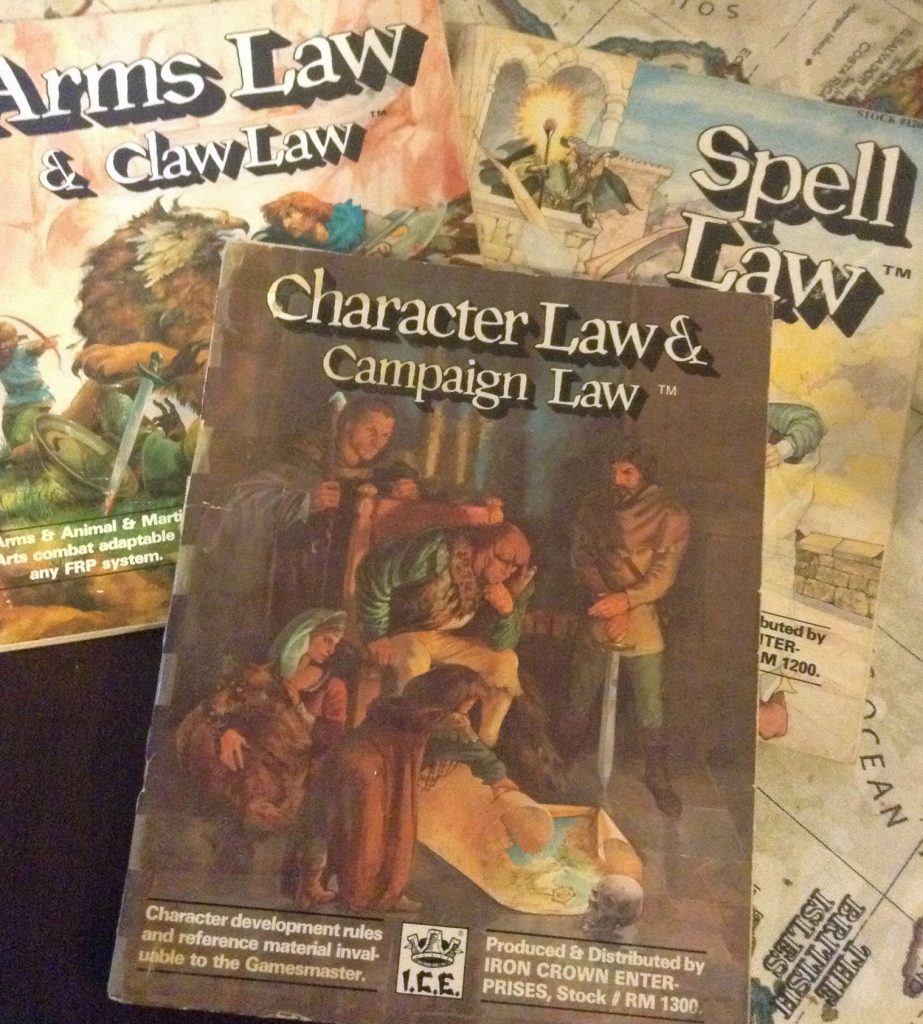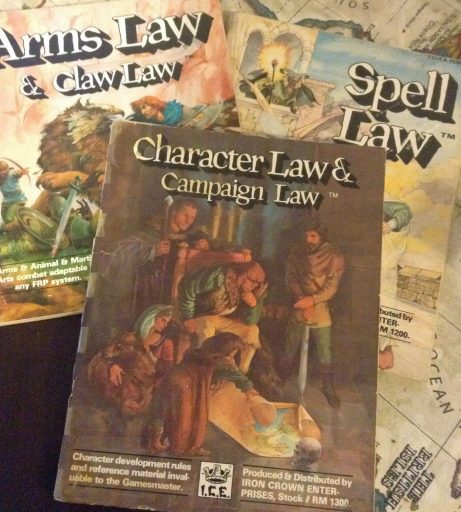
Ask me what the greatest role-playing tome of all time was, and I’ll say the D&D Rules Cyclopedia without hesitation. But ask me what the best fantasy role-playing game of all time is, and I’ll say Rolemaster without pausing for breath.
That might seem like something of a contradiction, but it’s not. Yes, the Rules Cyclopedia is an amazing piece of work that takes players from 1st to 36th level and covers almost every possible conceivable event in between (including building a castle, siege warfare, running a domain, naval warfare and a thousand things other editions of D&D have ignored or packaged into a third-rate supplement). Yes, I’ve gone on about how the Rules Cyclopedia is the best edition of D&D ever made (so far!). Yes to all that and a hundred other counter-arguments. The D&D Rules Cyclopedia is a brilliant, amazing and downright wonderful game to play.
Rolemaster is better.
If you’ll allow me to be specific here, this is the edition of Rolemaster I’m talking about.

This is my Rolemaster, and take it as written that I say that with just the same inflection and stress that people use when they say “David Tennant/Tom Baker/Matt Smith is my Doctor”. It brooks no debate or discussion. This is (quite literally, I just pulled it off the shelf) mine. And it is the best fantasy game ever written.
The cover dates on these beauties is 1984/1985. Rolemaster was originally conceived as a supplement to Advanced Dungeons & Dragons that added (depending on what and how much you used) an improved spell and combat system to that game. By this edition Rolemaster had morphed into being a full game in its own right (though options still exist in the text to used with D&D – more on those in a mo’). After this point, Rolemaster….. well, let’s just say I feel it lost its way. Subsequent editions (I have several of those on the shelf too) just lacked the sparkle of this edition. They didn’t gel, or added needless complexity to an already perfectly designed game.
But this edition was spot on, in every way.
Central to Rolemaster is the idea that magic comes from one of three general sources (or Realms, as Rolemaster calls them). There’s Essence, which is the magic in everything that binds all things together (much like The Force). Then there is Channeling, magic drawn (either freely given or taken unknowingly) from deities and other similarly powerful beings. Finally there’s Mentalism, which is magic powered by the intrinsic power of your own mind. Add in the non-magical use of Arms – brute force and weaponry – and you have the four “power sources” that make up the game.
Professions (or character classes, if you will) can be Pure spell users, drawing their spells from just one source, Hybrid spell users who draw from two, Semi spell users who combine spell casting and use of Arms or Non spell users who rely entirely on strength in Arms.
What all of that means is you get the following classes from those combinations of power sources, all in the core “player’s handbook” Character Law & Campaign Law:
- Pure Essence: Magician, Illusionist and Alchemist
- Pure Channeling: Cleric, Animist (druid) and Healer
- Pure Mentalism: Mentalist, Lay Healer and Seer
- Pure Arms: Fighter, Thief, Rogue and Warrior Monk
- Hybrid Essence & Channeling: Sorcerer
- Hybrid Essence & Mentalism: Mystic
- Hybrid Channeling & Mentalism: Astrologer
- Semi Essence & Arms: Monk
- Semi Channeling & Arms: Ranger
- Semi Mentalism & Arms: Bard
That’s 18 classes in the core rules alone, each of which having different focuses on their skills and Spell Lists, all with a structure and rationale that holds everything neatly together.
There are also 11 races and sub-races (Common Man, High Man, Half-Elf, Wood Elf, High Elf, Fair Elf, Dwarf, Halfling, Lesser Orc, Greater Orc and Troll. Yes, Troll) along with suggested optional restrictions on race & class combinations. Yes, you can play a Troll Sorcerer!
Character generation involves…. but wait. We’ll talk about that next time.
Till then!




Thanks for sharing about this. I have some Iron Crown Enterprises (ICE) Middle-Earth Roleplaying (MERP) books, my favorite being “Arnor,” but have mainly used them as resources for character backstories. I don’t have any of the fundamental books, so didn’t necessarily understand all the details. I certainly appreciate the brief overview you provided here today!
Many thanks for your comment. MERP is a terrific system, and the supplements do a great job of capturing the world of Middle-Earth. Rolemaster is just a short bump in complexity, and adds in a load of new options to the mix. I’m glad you’re enjoying the posts, thank again!